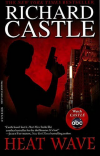
Well, what to make of this book. Heat Wave is written by fictional character, Richard Castle, from the television show, Castle. That’s not even quite the weird part. The book is also pretty much an episode of the television show, just with all the characters slightly changed. Any real author basing a novel so much on real life is likely going to be in a load of trouble with his family and friends.
Let’s.. take this in chunks:
The Writing
I had trouble getting into this book at first. As in, I had trouble at a very basic level in comprehension. It was making my brain hurt. Somewhere along the line, it got easier. I’m inclined to say that the writing got better, but it could simply be that I got used to it. I’m not quite sure, but I do have some examples, and the examples are from early on.
Metaphors and other bits of language that make you stop. And yea, they make you think, and yea, they can be a bit humorous. But they also make you stop. It interrupts the flow.
Page 1: “the tourists were […] seeking refuge in Starbucks over iced drinks ending in vowels.”
Page 3: “Rook had curled his hands to form skin binoculars”
Page 32: “what looked to her like an escalator to the basement painted red” — to describe a graph
Character name switches. She’s Nikki Heat. She’s Heat. She’s Detective Heat. She’s ‘the detective’. Just when you think the author(s) has finalized on Heat and is going to stick with it, out comes another Nikki Heat or just Nikki. And of course it happens with other characters as well. Sometimes trying to give us information by doing it, like ‘her friend’. As if we couldn’t gather that by context.
Number problems. It happened more than once. Here’s one from page 15: “Two thousand six scrape with a bouncer in SoHo; 2008, you pushed a guy […]” Did some style rulebook tell you not to start a sentence with a number? Because it’s just plain silly to say 2006 and 2008 in two different ways. Plus just silly to give a year that way in the first place.
Maybe an editor should’ve caught that? problems — page 33
“I see,” he said. And then he took the plunge. “Matthew Starr indulged some personal habits that compromised his personal fortune. He did damage.” Noah paused then took the plunge.
At one point, I had trouble following who was speaking, but looking back through, I can’t find where that was.
There were also times where something was mentioned and I had to try to remember what it was referring to. Specifically the ‘perfume ad’. If you weren’t paying attention the first time Heat’s internal monologue came up with that, you were lost. And since I was already overwhelmed with metaphors and odd little references, I did miss that the first time.
The whole feel of it, especially the dialogue, was quite like the show. If you’re not paying attention, you’re going to miss a quip. Even if you are paying attention, you’ll probably miss some quips. Or my geek repetoire is not geeky enough in the right directions (music, old movies, etc) to get everything.
The Characters
So instead of Castle, the bestselling novelist, we have Rook, the Pulitzer prize-winning journalist. Who is somehow also fabulously rich. And instead of whatever her name is, the detective on the show, we have Nikki Heat. Who you can reasonably read into as Castle’s impression of who the detective on the show is, whatever her name is. And other characters map as well, including 2 detectives or cops or whatever who do the girl detective’s bidding, but competently. Unlike some shows.
And, inexplicably, Castle/Rook’s mother, the diva. She shows up briefly in one scene, and her appearance was utterly pointless.
The characters are so like the television show, that I was brought up short every time we were reminded that Rook is a journalist. I guess he didn’t fit my image of a journalist. Wise-cracking, risk-taking, devil may care journalist? And, again, rich?
A book written by Castle?
Well, I can sort of see it. At first, I was reading it in my head in Nathan Fillion’s Castle voice, though eventually that dropped off. And yea, you can totally see a guy like him writing a hot detective chick parading around her apartment naked and then kicking butt in that state.
But then I think.. well, a real novelist.. well, a) wouldn’t map his life so closely like that, and b) should know his main character better. That is, I never really felt like I was inhabiting Nikki Heat. So I never felt like the author was either. But I guess that isn’t necessarily indicative of ‘not a real author’, but more of ‘not a very good author’.
Whoa, trippy man
The quote from the back of the book: “Rick Castle must have been doing his research because Nikki Heat has the unmistakable ring of truth.” — It actually got me thinking.. how many things on the show do we see Castle learning about that made it into the book? And I don’t know the answer to that, because I wasn’t paying close enough attention to the first season of Castle. Are there clever little things like that?
Summary
Interesting to read for what it is, though if it wasn’t what it is, I wouldn’t have read it. And if I had read it, I would’ve put it down. Because I would’ve found it rather dull. Reading all these mysteries is just confirming to me that I’m not particularly fond of them. (Ignoring that I did go through a stage in my youth of reading most of Sherlock Holmes.)
The acknowledgements deserve acknowledgement for being interesting and a bit amusing.
I’m giving the book a rather solid 3 (out of 5). An overall impression of ‘meh’, yet the compulsion to want to buy a copy and mark it up in red ink to figure out why I had such problems with its language.
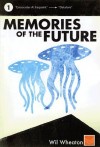
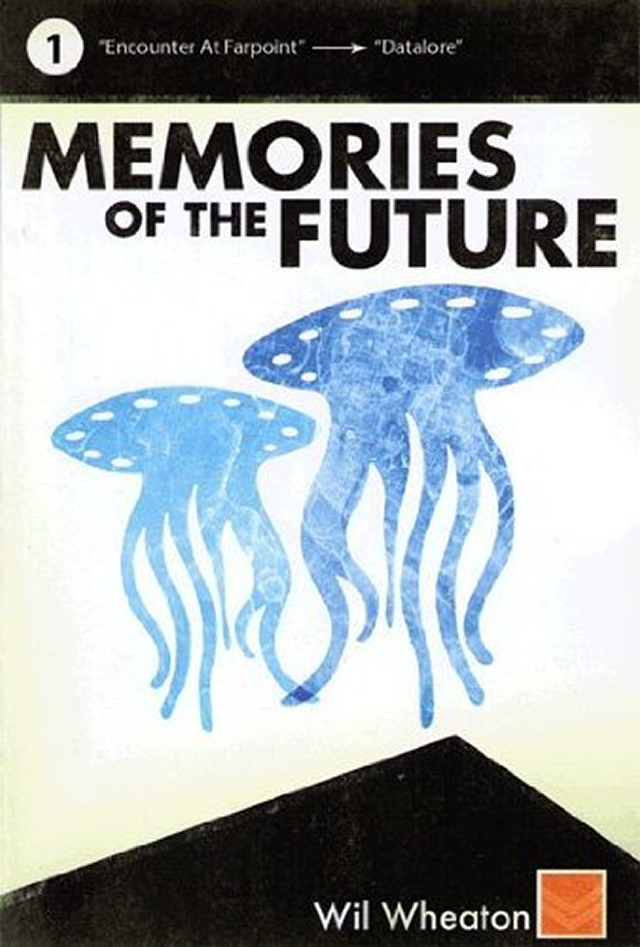

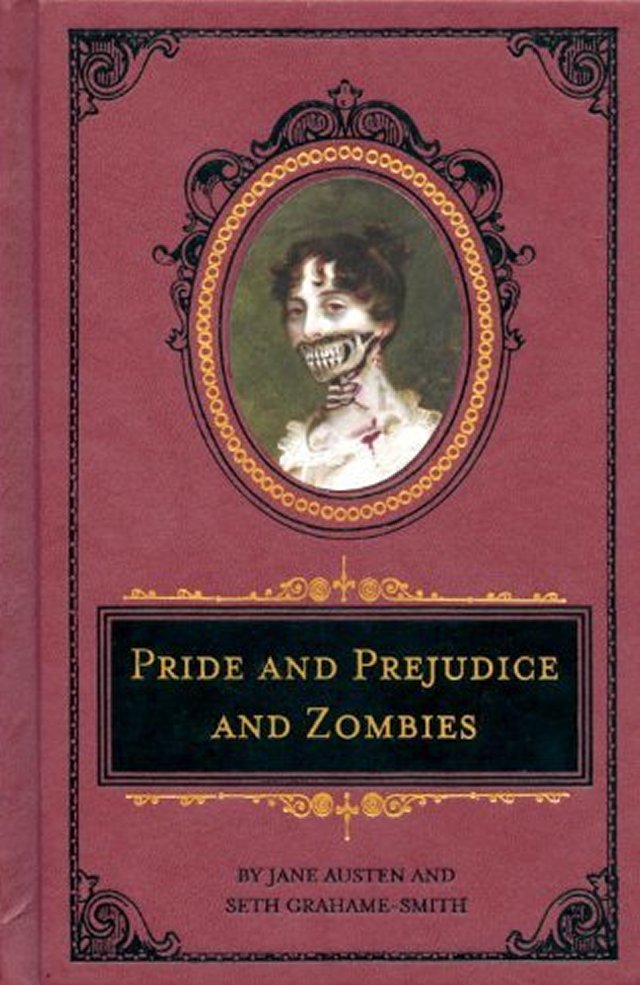
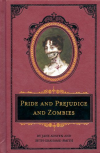 I’m the one who suggested we read Pride and Prejudice and Zombies, by Jane Austen and Seth Grahame-Smith, for October, in the spirit of Halloween. So of course it figures that I’m the last one to finish it, and not until December. It was a hard slog. Not quite as hard as Point of Hopes, but less things compelling me to keep reading. I definitely would’ve abandoned it after a few pages if I wasn’t obligated to keep going.
I’m the one who suggested we read Pride and Prejudice and Zombies, by Jane Austen and Seth Grahame-Smith, for October, in the spirit of Halloween. So of course it figures that I’m the last one to finish it, and not until December. It was a hard slog. Not quite as hard as Point of Hopes, but less things compelling me to keep reading. I definitely would’ve abandoned it after a few pages if I wasn’t obligated to keep going.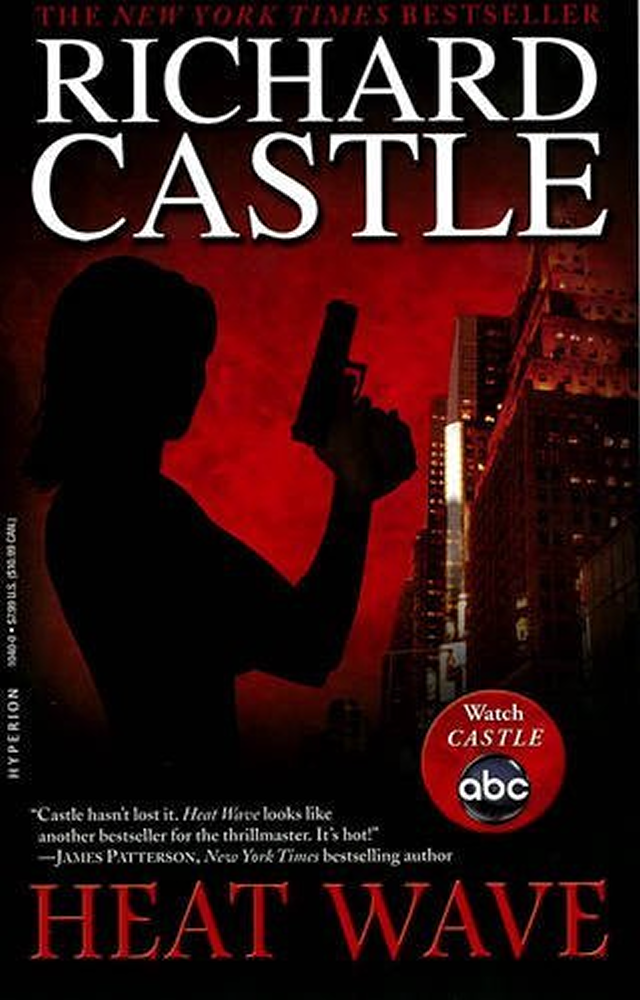
 From the front flap:
From the front flap: